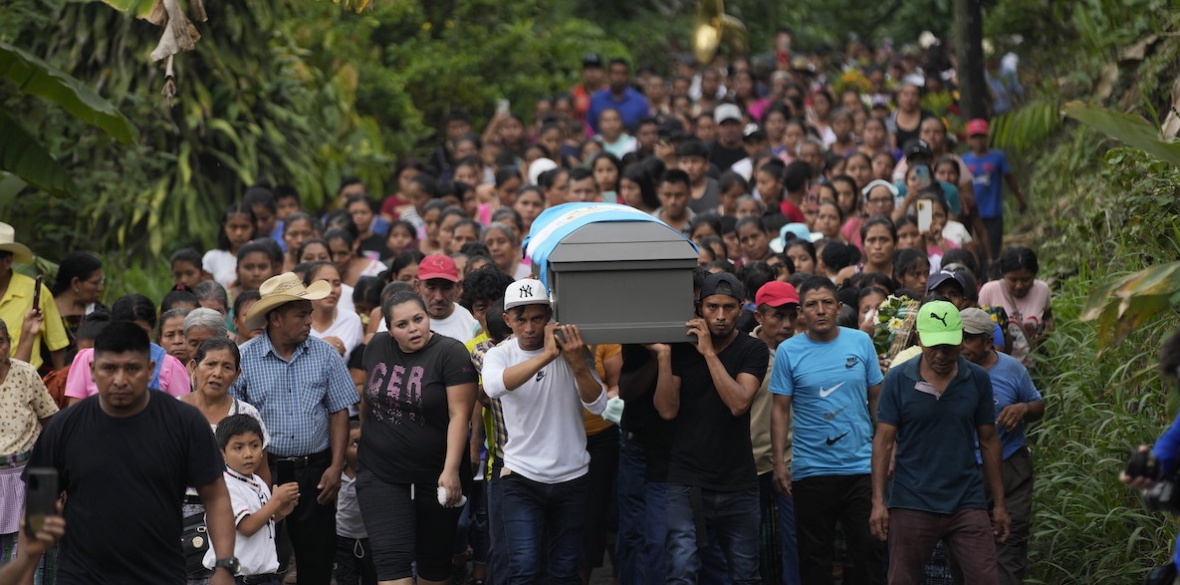This is the last article you can read this month
You can read more article this month
You can read more articles this month
Sorry your limit is up for this month
Reset on:
Please help support the Morning Star by subscribing here
THE appalling fire which killed 40 migrants in a holding centre in Ciudad Juarez, Mexico — on the border with Texas — on March 27 looked at first like a body blow to President Andres Manuel Lopez Obrador and his progressive policies.
Amlo has indeed indicated that it was for him one of the two most demoralising incidents in his term so far. But his reaction, followed by a remarkable series of successes, has swiftly restored his prestige.
He immediately took action to provide care to the survivors and to promote impartial investigation; a total of eight individuals have so far been arrested and charged, both local guards and regional officers of the notoriously corrupt National Migration Institute (INM) and one migrant who allegedly started the fire (reports indicate that the migrant was given a lighter by one of the guards, which if true strongly suggests an inside plot).
Amlo also appointed a much-respected human rights expert, Father A Solalinde, to inspect the migration system and recommend a thorough overhaul.
The INM will now be replaced by a national co-ordinating office of migrant and foreign citizens’ affairs, with representatives from churches, academics, the National Human Rights Commission, the National Guard, health, education and social services, and from consulates of the Central American countries.
It has also independently been revealed that the right-wing governor of Chihuahua State (where Ciudad Juarez is located) made a deal to pay $200 million to the Republican governor of Texas to assist actions designed to prevent migrants from crossing the border.
In other words, conservative anti-migrant politicking on both sides of the border has been working to undermine any humanitarian policies of Amlo’s government.
Mexico has been working with the US to establish legal migration programmes, and to deal with the problem at source by promoting economic and social justice in Central America.
It has set the example by investing its limited resources in providing two of its social programmes —an agroforestry scheme for peasant farmers and an apprenticeship scheme — free of charge to tens of thousands of poor people in Guatemala, El Salvador, Honduras and Belize; beneficiaries testify that they might well have decided to migrate if it were not for this support.
US President Joe Biden agreed in principle two years ago to provide $4 billion to finance a massive expansion of these schemes, but the US Congress blocked the proposal. Amlo continues to denounce Washington’s provision of $39bn for war in Ukraine and nothing in aid to Central America.
In the meantime, Amlo continues to score notable political successes at home. The balance of power in the corrupt, expensive and biased National Electoral Institute (INE) has finally changed as four of its governing councillors including its pernicious director Lorenzo Cordova came to the end of their terms.
Their replacements were chosen by lot (rather than being political party appointees), with a gender balance requirement, so the new director is an independent woman who (along with the other three new councillors) has already begun to eliminate corruption and conservative bias.
Nationalisation —or at least reassertion of majority national and public control — of the energy sector was Amlo’s intention from the start, and remarkably he succeeded in getting the US and Canada to accept it in the revised trade treaty in 2020.
But domestic political opposition and manipulation of the judicial system have forced the president to repeatedly pass new laws to insist on sovereignty over oil, gas, electricity and now lithium.
But on April 4 he surprised observers by announcing an agreement to purchase 13 electricity-generating plants from Spanish company Iberdrola. He had long denounced the corrupt deal by which under the old regime Iberdrola took control of such a large chunk of the sector, but with typical political finesse, he negotiated behind the scenes to purchase these holdings on favourable terms and incorporate them into the public utility CFE.
The very next day Amlo scored a notable diplomatic success by hosting an online summit of 11 Latin American heads of state to coordinate anti-inflation measures. It will be followed by a face-to-face summit in Cancun on May 6 and 7, promoting regional integration.
Then, as the controversy in the US over Mexican drug cartels rumbled on, Mexico took decisive action to defuse the crisis, culminating in a high-level meeting at the White House on April 13 where Amlo’s complete security team (the foreign minister, head of security, attorney-general and defence and navy secretaries) met with their US counterparts.
They agreed on joint action to combat fentanyl addiction and trafficking, and also, a key point for Mexico, to restrict the uncontrolled sale of assault weapons in the US and their trafficking into Mexico. On this, Mexico is in fact showing the way, also offering advice on social policy to prevent addiction.
Considering the difficulties both internal and external, Mexico’s efforts to forge a sovereign and socially progressive policy are nothing short of heroic.
It is worth noting that in a recent interview Colombian President Gustavo Petro, asked to make one-word comments on several of his Latin American colleagues, said of Amlo: “Genial” — brilliant.
It is encouraging to see that in the last couple of weeks, Amlo has been visited by his old friend Jeremy Corbyn (with Corbyn’s Mexican partner Laura Alvarez).
They agreed on the importance of international solidarity and British solidarity with Mexico and its 4T Transformation is surely more necessary than ever.
David Raby is a retired academic and independent researcher on Latin America — follow him on Twitter @DLRaby.









